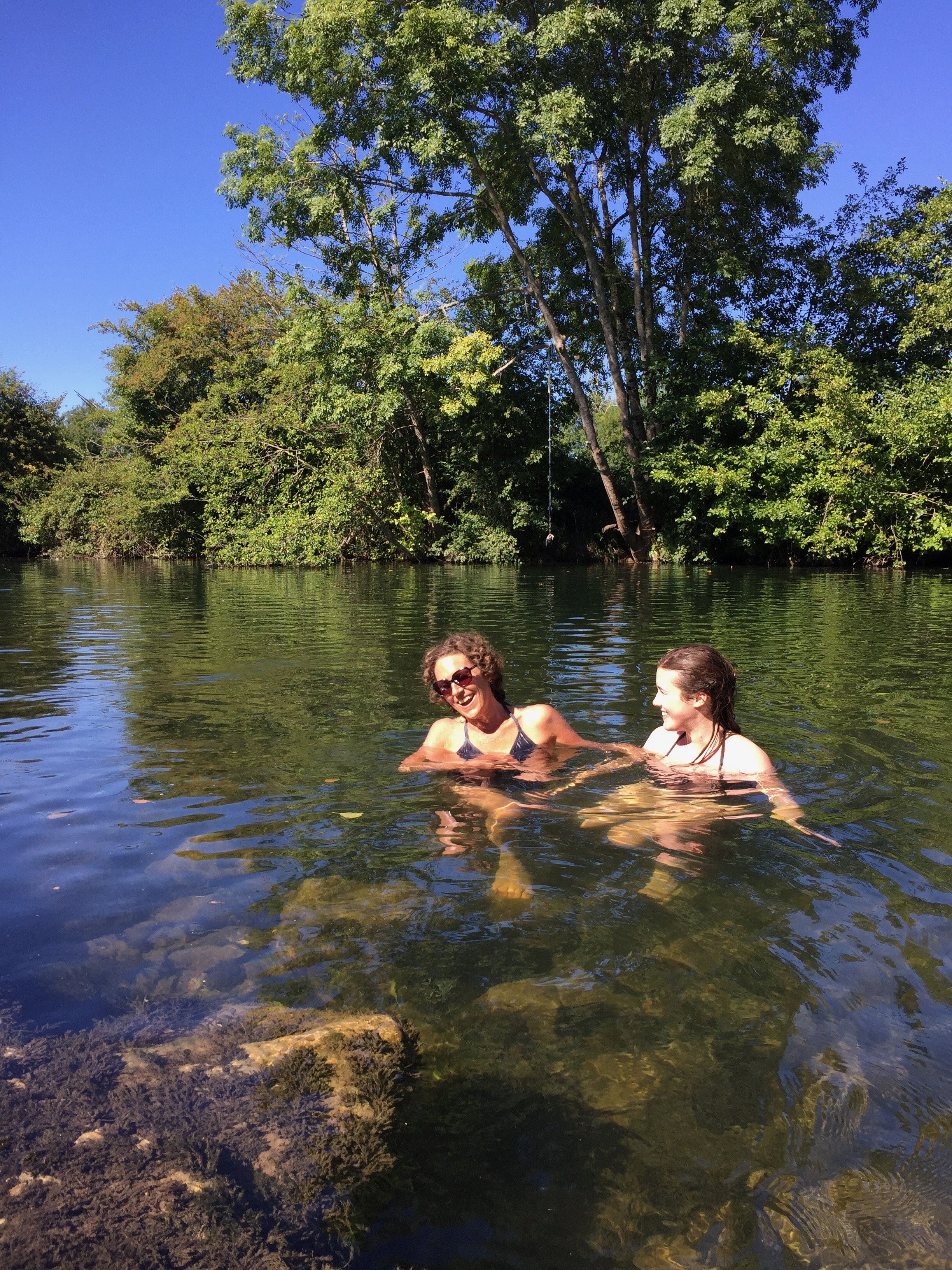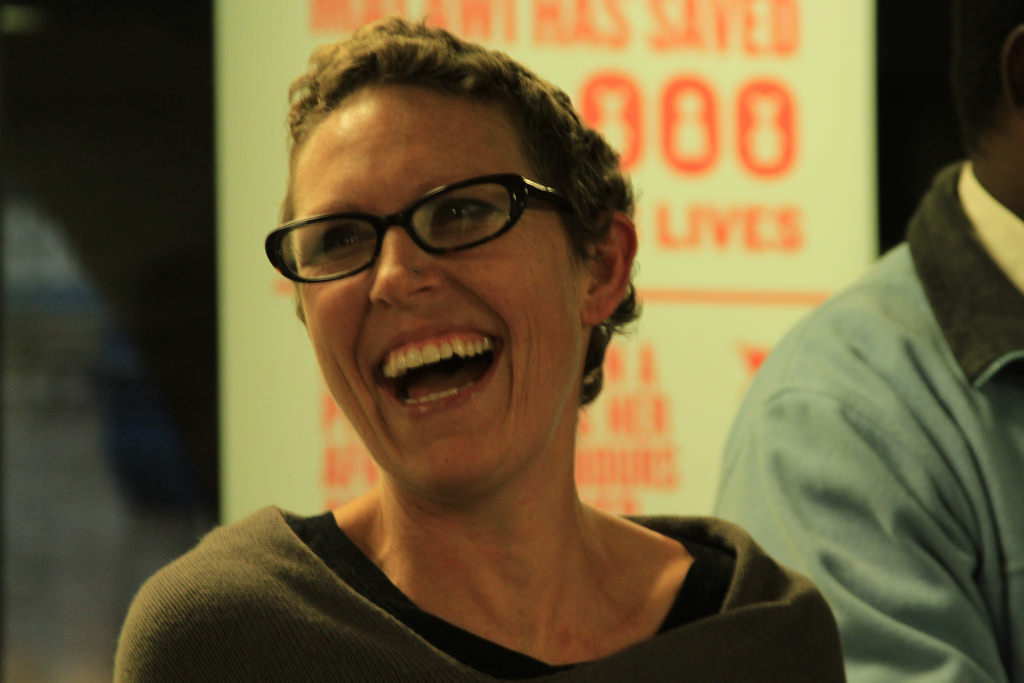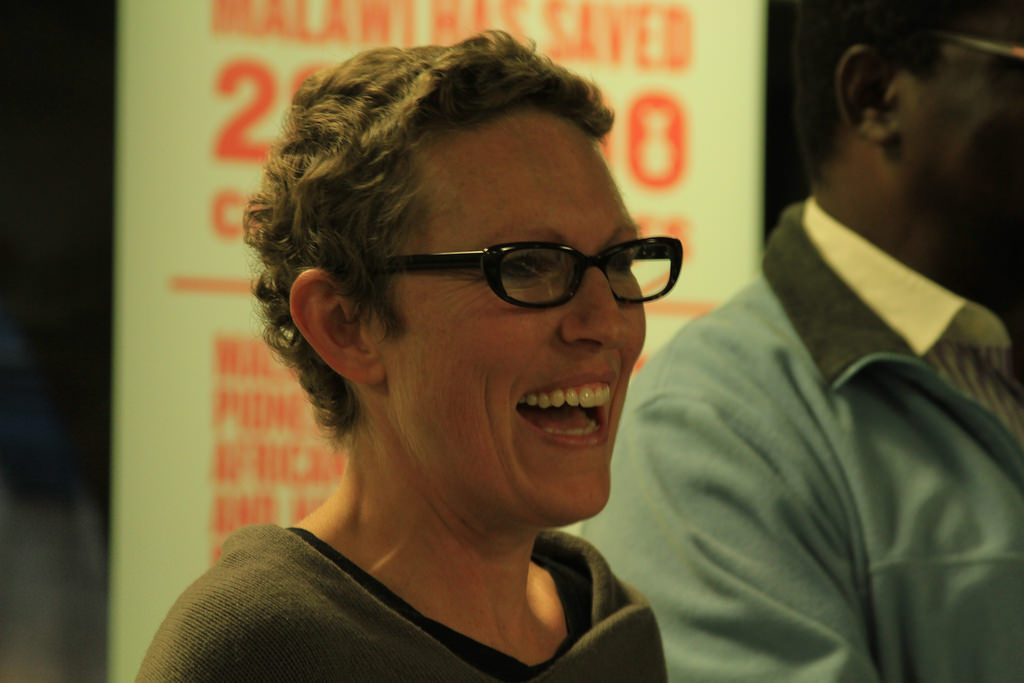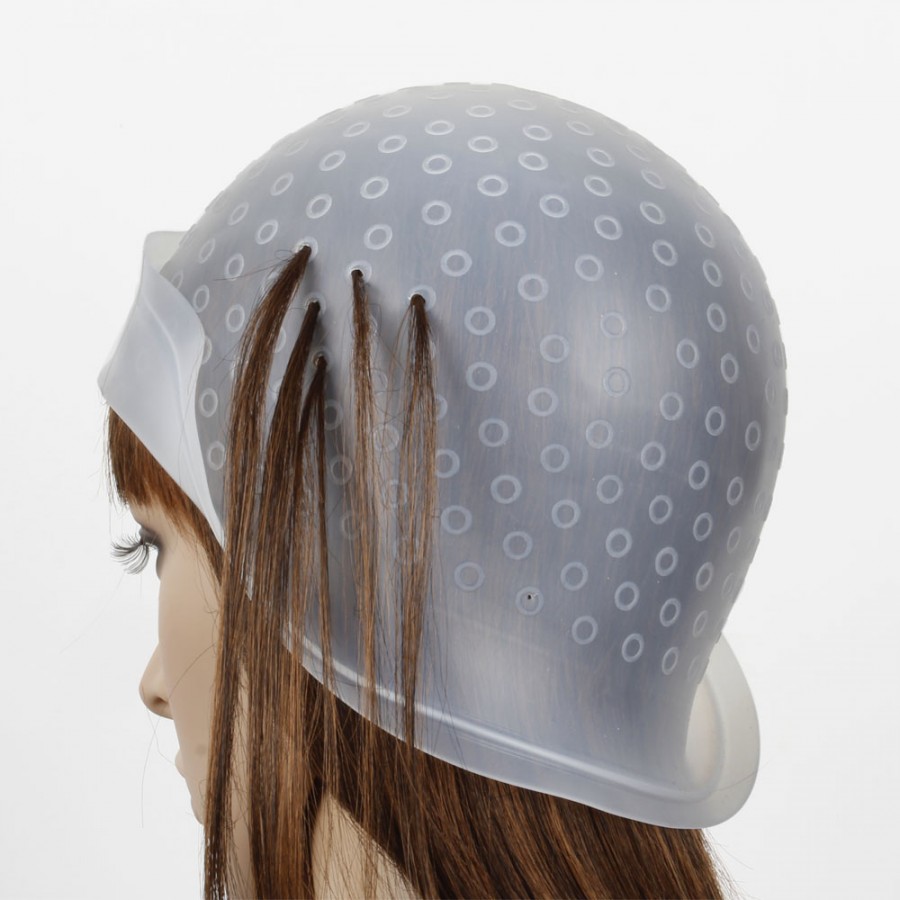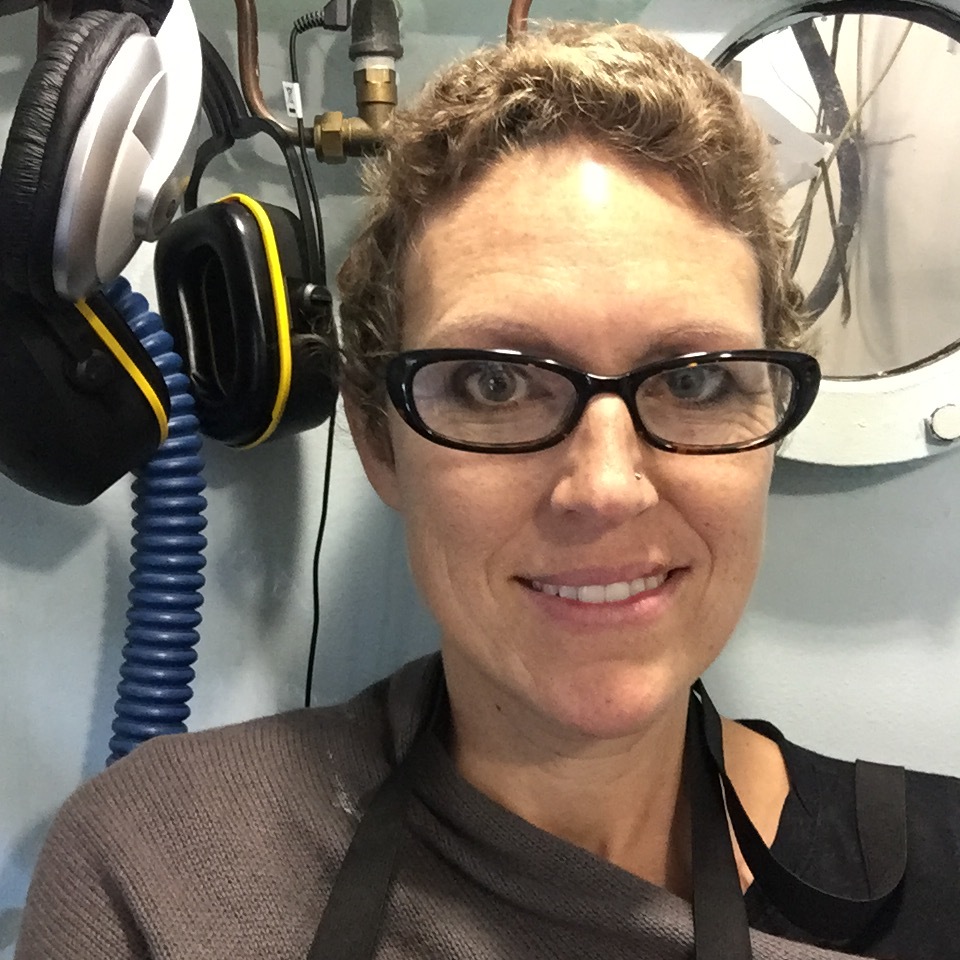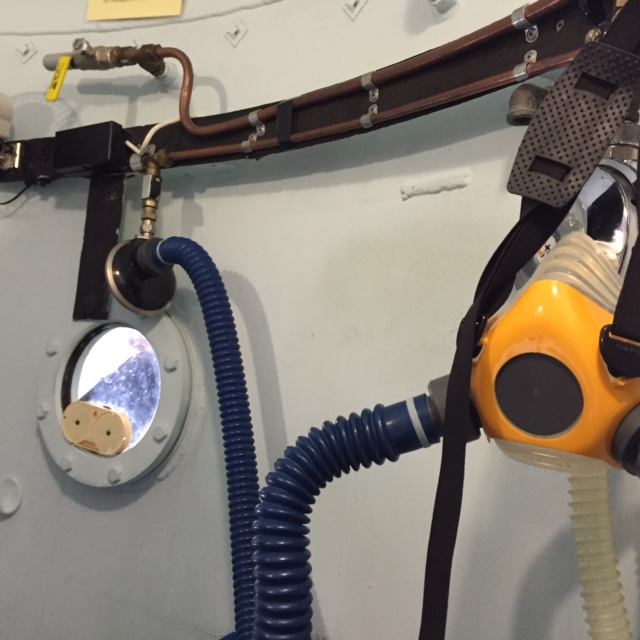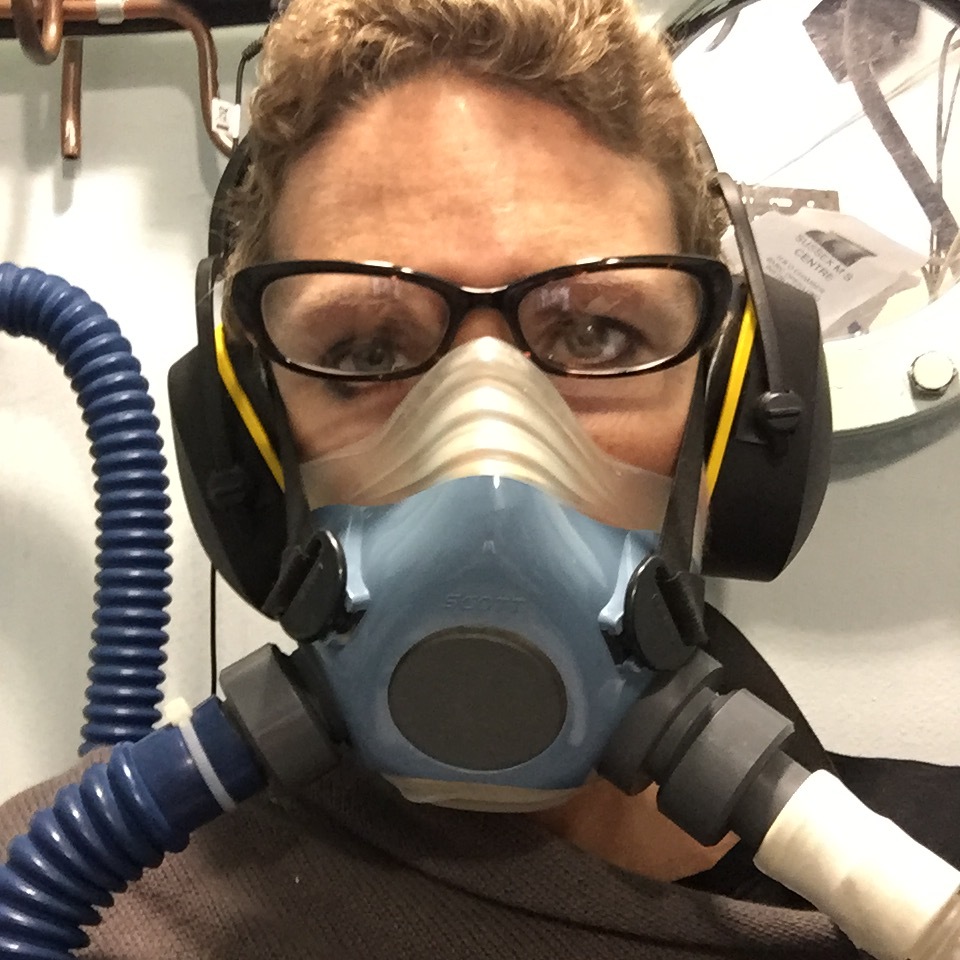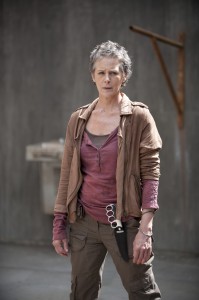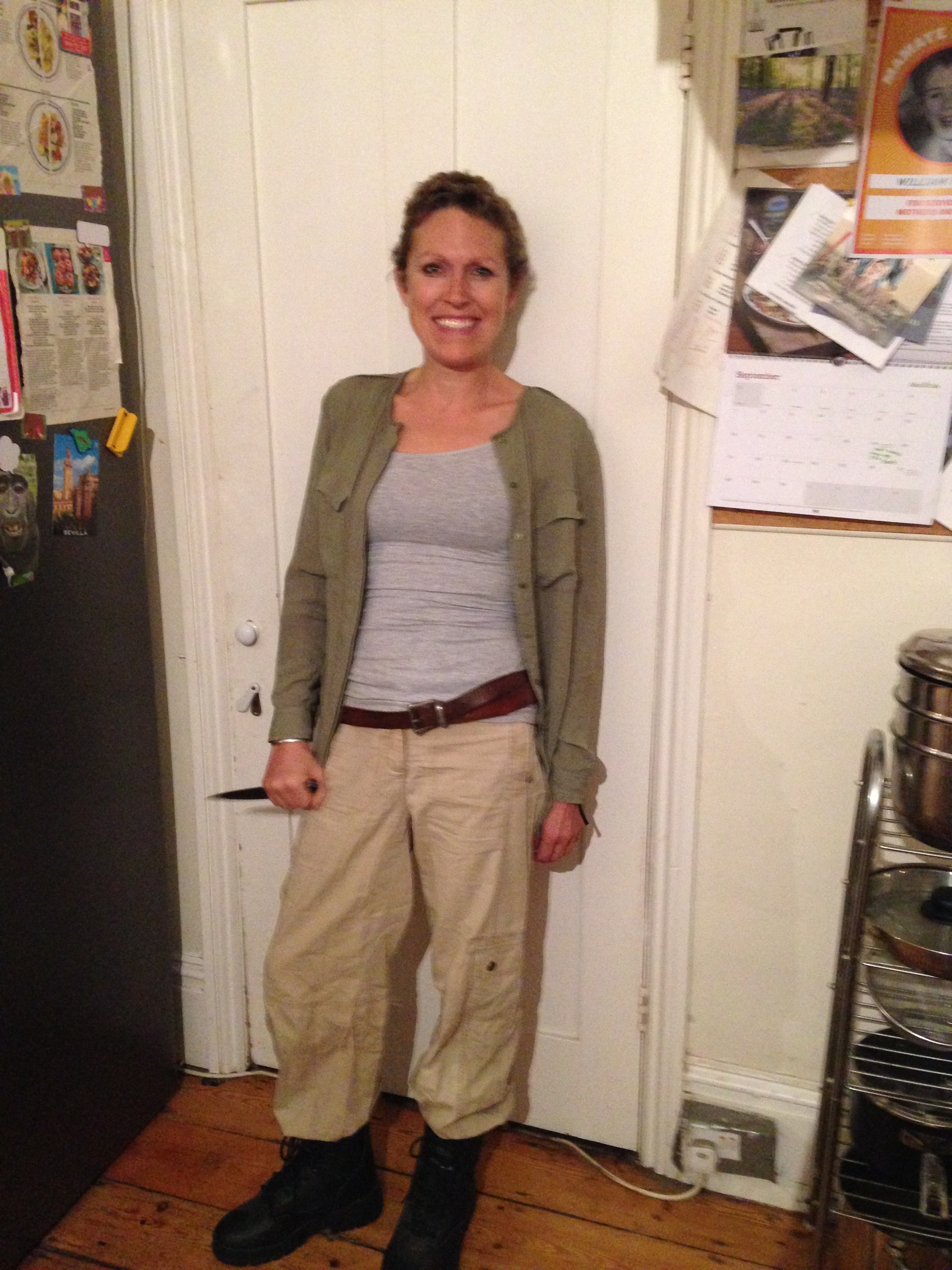Growing curly gracefully; adding to my healing arsenal and diving 16ft
/My hair is growing thick and fast and brown and curly (see pictures of me looking smiley). Since a child I have been blond. Originally very, very blond and as I grew into my teens it started getting darker and more mousey until I discovered hydrogen peroxide. This was my standard hair lightener for a couple of years until I was old enough and rich enough to go to a real hair dresser where I was introduced to the torture of the plastic cap. A cap covered in tiny holes which they would squeeze onto your head. They used ametal instrumentto pull strips of hair out through the holes. You ended up looking like a mad professor or someone who had stuck their finger onto a live wire. I endured many many such sessions. With very thick hair to start with my head would throb like mad, but for beauty I endured. It took years before they discovered more dignified and less painful ways to colour hair. What I never considered then was the amount of chemical rubbish I was exposing myself to. Years and years of yuk. I would have been better off sticking with the hydrogen peroxide - which turns out to have many good properties (the version made for human consumption). After my last bout of chemo and hair loss I considered just gutting it and going brown, but I simply could not. I had never considered myself particularly exercised about my looks but clearly I am. I had grown up a blond, it was part of my identity. So I continued to dye my hair even after my first cancer. This time, in my pure and clean living - there is no way I will be returning for any toxic hair colouring. So begins my life as a nearly brunette (with the very very odd white hair). I may need the skills of a good hair dresser though as I get through the next painful stage of hair growth. It has come through again curly. Not as tight curls as last time - the chemo curl, but still curly. Within a short while it will just be big hair, out of control. But I want to grow it back to a length I am used to and this means getting through the next few months as gracefully as possible.
The problem and joy of having advanced cancer, is that everyone is supremely lovely to you. Which in most cases is something that just makes me feel loved and supported. Except when I suspect they just want to make me feel good - I doubt the many lovely comments about how well I suit short brown curly hair - even though I appreciate them greatly.
My recent and fourth trip to Germany was good. I went with my friend Kate who helped distract me with gossip and suduku. I try and play this to combat chemo brain and the effect of hormones which also impact the brain. The travel there was straight forward, we flew from Heathrow to Hamburg and caught the train to Gottingen, my usual route. On the Thursday I had my bloods taken, with the results were shared with me on the Friday. For some reason I was far more nervous this time getting the results. I had had a pain around my liver and just contemplating the idea that the results might indicate some progression was terrifying. I have been so strong in my resolve and belief that I can conquer this, but at moments like that you know that in a second that resolve could just crack.
Dr Martin looks at a number of things to determine how I am doing. My weight (which has gone down but not since last time, this was weight I lost earlier on when I changed my diet so radically); my liver markers, my inflammation markers, white cell count etc, breast cancer marker and my cancer load. He also asks how I am and generally takes on board how I look. On the Friday I came into the clinic, already nervous, knowing I would hear my results soon. The time before, I had met him at the reception before I even started my treatment and he had told me there and then he was happy about my results. This time he was not at the reception, only Christina the nurse was, and she was very busy. I could see my results sitting on her desk. No one said anything, so of course I started imagining the worst and from that moment on began to read into everything Christina did or said. Why was she not telling me what they said? Was she avoiding my eye? Surely she knows! I am desperate to know what they say and her silence has to mean that she cannot bring herself to mention them in case she reveals the truth and that is Dr Martin’s job. The reality was, she was busy as they were closing the clinic for their annual holiday and so had to squeeze in more appointments than usual and it is not her job to communicate results to patients anyway. Dr Martin was busy and I only got to see him at past midday, just before he administered my vaccine. When he did come in with my results in his hand, he communicated them as if he had expected nothing less and could not understand why I had been in such turmoil. I took that to mean that perhaps he has seen a trend and therefore had some sense of what to expect, and given my good health he was not surprised by them. The liver bloods were all good, the white cell count still bit low - but he puts this down to all the chemo I have had which has affected my bone marrow, my inflammation markers were very low and my iron was good (cancer gobbles iron when it starts progressing). My circulating cancer cell (CEA) was down from 4.3 last time to 3.0. The only marker that he admitted he would have liked to have seen more change was my breast cancer maker CA 125 - this is just under double the high point of the normal range - it has reduced slightly from last time but not lots. He did though say, and I have read much about this, that this can be an unpredictable marker and can confuse the picture - so should not be taken alone. I still would have liked to see it going down more, but I will give it time :).
The relief took a while to sink in. The treatment makes me a bit tired and after the vaccine I get the interferon and related fever. This time however the fever was less than the time before. I have been taking and recording my temperature since my second vaccine, to compare how I respond. The first time I did this (during the heat of the summer), my temperature peaked at 39.2 degrees. Last time it peaked at 38.7 and this time it was only 38.2 and the fever took longer to come on and lasted for less time. I asked Dr Martin about this and his response was that this is because there is less cancer around my body to fight.
On the Saturday morning, the day after the vaccine, I had my last hyperthermia treatment after which we made our way to the train station. We had seats on a BA flight that left at 16.50 and we were catching the 11.43 train from Gottingen to get into Hamburg 2 hours later. This has proved a comfortable transit time from the station to the airport with time for lunch. This time we encountered the mother of all train disasters which meant we missed our flight and the next one and ended up having to book a room into an airport hotel and catch the early flight on that Sunday morning.
UK Rail network at its best
It all started with an announcement that the train was running 20 minutes late. This was not bad as we had some leeway. We got on the late train and found a seat in one of the nice Harry Potter compartments and settled down to some suduku and reading, feeling quite relaxed. And then the train stopped. And it did not start again. It had stopped in the middle of a very rural area with a small road which ran parallel to the train line and a crop field. So the view was pretty at least. Phone connection however was not so good. I am so used to hopeless disastrous journeys on the UK rail network I was rather shocked that the German network could and did suffer them also. We had a nice man in our compartment who translated all the announcements and we got a good insight into how the German rail network deals with a broken down train situation. Actually, it was not the train it was the power line, which a previous train had damaged. First, they kept us regularly updated. Second, they offered all passengers free drinks. Then, worried that people would start getting too hot and need air, as the air conditioning system (along with the water and flush function in the loos) had stopped with no power also. So they opened the doors of the train. We then saw a group of young people with rucksacks who had clearly decided they were not going to wait for the problem to resolve, and they jumped off the train and we saw them walking past us down the little road, smiling and laughing. But then they closed the doors again. They obviously decided that opening the doors was not a very safe thing to do, until of course the fire brigade arrived. The firemen stopped outside our carriage so we got a prime time seat and could watch what was going on. They all looked as if they had just got out of bed and and were happy for the overtime. Being called up on a weekend was not a usual occurrence. They brought crates of bottles of water which they left in the doorways of the carriages to make sure people were hydrated. Then they brought a medic onto the train and walked up and down to check there were no medical emergencies that needed attention. Meanwhile they keep us updated. It became clear that the delay is going to be quite long and they are looking for anengine that could shunt the train past the section of broken power cables. But arranging this would take time. Other trains on the line had been evacuated and passengers taken by buses, but they had run out of buses.
All this time we are trying to work out what to do and thank goodness Rupert was at homeand my phone had some connection for phone but not for internet. He spent almost 4 hours on and off the phone with us and on the phone with BA trying to rebook us onto another flight. We paid a £100 transfer fee for the later flight, but we missed this also. At one point we worked out that the train had come to a halt relatively near Hannover and there was a later plane from there if we could catch it. So we decided that once the train was shunted past the broken cables we would get off at the next station where they would reconnect the train to the cables, and we would catch a taxi to Hannover. If we stayed on the train to Hamburg we would certainly miss the last plane from there. Funnily enough hundreds of other people from this and earlier trains, had decided to get off at this station too, and we found ourselves in a tiny, middle of nowhere town with crowds of people desperately working out how to get out. No taxis. No motels. Nothing. After a few failed attempts to find someone who might drive us we realised we had no choice but to get ourselves back to Hamburg and accept we were not going to get home that night. At that point we had a slightly frantic charge back to the train we had just got off, and which was preparing to leave. Thank goodness we made it back on or we would possibly still be in that tiny little place.
Through all of this the atmosphere on the train was that of one big party. There was one group dressed in traditional costume who were clearly on their way to some festival or party. They had boxes of alcohol and when the train stopped they started working their way through it. Singing loudly and eventually, after a few hours, collapsing in various states of disarray, across the carriage. We had to pass them all when we moved to the front of the train to get off at the small station. There were a couple sprawled in the passage connecting two carriages, who were literally so drunk they could not move their legs out of the way, even though they tried. I think we may have run over a least a foot with our suitcases as we squeezed past. Then, when the train finally pulled away, I noticed a large group of our carriage standing up looking through the window, smiling and waving frantically. There was film crew on the platform. This was clearly such a rare event it hit the local and who knows, possibly the national news. I forgot to mention the compensation forms which were handed out personally to each passenger with an explanation of how to claim for the delay. Wow.
I have added to my treatment regime. My hope is that all will be well and even better at my next German visit. This will be the last of the group of five that is part of this dendritic cell therapy. If all OK I will move to one vaccine every three months. So I have been reflecting on my regime to make sure I build on it to keep that healing going through the 3 month gap between vaccines. Here are some of the changes I have made.
I am trying to increase my juicing. I had been having a pint a day. I am working to increase this to 2 pints a day. I use almost 95% organic vegetables when I make it myself, but I have started buying the odd juice from the Station juice van. It is hard when I am working in London (which I do about twice a week) to actually fit in making the juice, let alone sourcing the content and being a Mum to the boys and all this entails (even when I am to going to London).
Next - I am in the middle of a parasite cleanse. This was something, as I noted in my last blog that Chris Woollams from Cancer Active suggested. I have travelled all my life and to many many different countries. We all have parasites (good and bad), but if your load is too great they simply compete with you for nutrients. Many simply live in your liver - and I need to give my liver the best chance of being healthy, so for me it was a no brainer. I use a Neways product called Parafree (which has black walnut in it). I continue with my super artemisinin and then I supplement with a good probiotic and continue with daily sauerkraut to build up my gut flora etc. The course was 25 days with a 5 day break and I am on the second 25 day stint, to kill any last nasties. I certainly felt a bit headachy when I started and I read up where I could about peoples experience of parasite cleanses. What I learnt was that side effects are related to death of parasites racing round your blood and your body trying to manage this all. It also confirmed that I would suggest anyone with cancer consider this as an approach. It just seems logical. So much of your immunity depends on your gut and if you are competing for nutrients etc best get rid of the bugs.
I have also started taking 100mg of aspirin daily and cimetidine. I also take 500mg of metformin twice a day.
Why Cimetidine?
Well Cimetidine is a type of anti histamine used for heart burn - it is also known by its brand name Tagamet. The lifeextension.com website describes it like this ‘Although cimetidine was developed to relieve heartburn, acid indigestion and sour stomach, numerous studies demonstrate that this readily available medication may offer powerful support in the fight against cancer. Unfortunately, many cancer patients and even oncologists remain unaware of the compelling evidence demonstrating its efficacy. By preventing cancer metastasis (spread), slowing or halting tumour growth, and prolonging survival, cimetidine may serve as an important adjuvant therapy for people fighting colon cancer and other malignancies’
Why aspirin?
I have known for a while that studies have indicated that long term aspirin use can reduce the likelihood of recurrence and I had even been thinking about starting it before I was diagnosed this time, but never did. The evidence is only growing that it can e.g. slow the spread of lung cancer by 20% to 30% and that taking a low dose aspirin a day for more than 10 years can drop stomach cancer deaths by 31%. According to the MD Anderson Cancer Centre a study of recovering breast cancer patients found those how took a daily aspirin for 3 - 5 years were 60% less likely to suffer from a recurrence. The aspirin swallowers also were 71% less likely to die as a result of breast cancer. If only I had acted sooner!
Finally why metformin?
If you have not already watched the Surviving Terminal Cancer documentary (link on resources page), please do. It features the story of Professor Ben Williams who was diagnosed with a tumour in March 1995. The entire right side of his brain was “infested with a tumour”. He took his treatment into his own hands and is inspiration to many people like me. Cancer will find all sorts of routes to thrive and this calls for multiple approaches to block and confuse the cancer. Single therapies will never last long as the cancer will simply re-route. And so Ben Williams built himself a regime which included a whole range of drugs, many of which I am using and a good number what are called repurposed drugsi.e. designed for some other condition but with cancer prevention/fighting component - such as aspirin. Among the drugs he used was metformin, which is originally a drug used for diabetics. Here is what Professor Dalgleish says about it (and other drugs I am taking):
“Say we have a patient who is fit and healthy in many ways but is going to be dead within a few months. If that patient asks me ‘Is there anything else I can do?’ I will say ‘Yes. The data suggests you could consider metformin which appears to selectively reduce glucose uptake by tumour cells as opposed to normal cells. I suggest aspirin to tackle your inflammation and let’s correct your Vitamin D levels to boost your immune system’.
I do not know what Prof Dalgleish would think about hyperbaric oxygen therapy as this is another treatment I have just introduced to my armoury and I will talk about this a bit later. First I wanted to talk about the recent documentaries by Ty Bolinger and the Truth About Cancer crew. I have been watching this avidly. I shared the link on the Cancer is Pants Facebook (https://go.thetruthaboutcancer.com). He produced a series last year and I saw a couple of them. This year the series was more hi tech and professional. They released one a day for nine days so for the past week or so I have been glued to these. I honestly believe anyone who is affected by cancer, either themselves or a loved one, should watch this series. It is a bit ‘believe in God and he will give you the answer’, an underlying creationist theme that bubbles up now and again, there is also a bit too much soft focus lens on Ty and his family. But if you can overlook that, just listen there is loads of good information and importantly, hope. I have also grown to rather like Ty and his wife Charlene and am thankful for them sticking their necks out and pulling this together, so I am OK with soft focus. They feature what they call ‘cancer conquerers’, people who have had really dire prognosis and who have lived. They tell their stories about what it was that they did to beat cancer. These are the best sorts of stories for someone like me. Just hearing a real live person who was stage IV and who is living now many years on just makes all the difference. If just one person has managed to defy the odds then why can’t I? But what is clear to me is that there are many more than one person, there are a good number covered here and in the book Radical Remissions and elsewhere. The message of the documentary series is - cancer does not have to be a death sentence. Take control of your healing. They interview a whole range of practitioners from over the world who support people with cancer and who use a range of different, importantly non toxic, therapies. One, called RIGVIR, is a new virus based approach which was discovered in Latvia, and has had really impressive results (documented in scientific journals) with a range of cancers. It is currently registered for use in Latvia and people in Latvia with melanoma can get it on their health system. For other cancers it is still available only privately. But, if I was not doing Dendritic Cell Therapy this would definitely be a treatment I would explore.
There is a very explicit anti big pharma and the ‘conventional’ medical establishment message. I am in no doubt that cancer research and cancer treatment is dominated by a treatment approach that is far too commercially driven and which has, as a result, either directly or indirectly suppressed alternative promising treatments that are not radiotherapy, surgery or chemotherapy. For those oncologists who might have watched this I can imagine they feel rather bashed and as if they were all part of some deliberate plan to cause unnecessary pain and harm to their patients for commercial gain. This is unfortunate as there is some good substance in the series - and if only we really could engage oncologists and cancer research in a more cooperative way there would not be what feels like two extreme camps. What can each learn from the other? There are too many examples of doctors who offer alternative therapies being what can only be called persecuted and patients prevented from exercising choice and accessing other treatments for there to be no sniff of conspiracy. Why would the FDA or equivalent get so hot under the collar over apricot kernels or other different approaches? They are quite OK allowing people to have treatments which are well documented to have some horrible toxic effects and limited if any chance of prolonging life yet they are prepared to throw millions (mainly, but not exclusively in the USA) trying to close down clinics and prosecute practitioners who offer another way. It is not as if we have made much progress in the fight against cancer - we still have similar miserable outcomes as years ago.
We are just better at diagnosing early (this helps but by the time there is a solid tumor the cancer has already been around for a very long time) and we are making some strides in alternative approaches but lets hope you are alive in time to see any of them being made available to those of us with advanced cancer now.
If the series is rather ardently anti conventional therapies it is I would suggest frustration from the efforts that have been made to silence any alternative view. In the UK, oncologists are shackled by the protocols they have to follow. For some of the above medicines I am using I have had to seek out alternative means of accessing them because, despite well documented potential benefits of these low cost drugs, oncologists do not seem to have the liberty to prescribe any of them. They have the straight jacket of protocol.
I am still interested in investigating what is happening with the Medical Innovations Bill which I have heard the Lib Dems partly scuppered prior to the election. I can’t admit to any insights but understand it will have another hearing. I want to find out if this would open the door to more flexibility in the treatment of advance cancer patients to enable a more imaginative and personalised treatment plan and increase access to trial drugs before our immune system has been utterly devastated by round after round of chemo.
Mainly the series helped me not feel alone and gave me more fight. It is difficult not to doubt and to feel unsure, but when you hear from around the world, stories of survivors and different treatment alternatives I have hope. Concrete, tangible hope and so I continue with my regime, upping my juices, sticking to my diet and supplements and now adding Hyperbaric Oxygen Therapy.
Hyperbaric Oxygen Therapy
HBOT has support as an aid in cancer treatment and so I decided to find out more. The argument, according to the Cancer Active website runs that ‘using a Hyperbaric Chamber (which is designed to increase blood oxygen levels and is proven to work in this way with a number of illnesses), will overcome one of the main influences of cancer, namely that cancer exists in a low-oxygen environment and plentiful oxygen can kill it off. HBOT has been shown to significantly reduce inflammation in the body and this can be a precursor to cancer. The site reviews some of the evidence which shows it is already used to good effect when used with radiotherapy where it seems to reduce tissue damage and side effects. Some centres use it to improve the uptake of chemotherapy drugs and improve results. Research has also shown that HBOT not only increases the oxygen levels in the body’s healthy and radiation damaged tissue but it will also increase the oxygen levels in cancer therapy.’
It was a scientist called Otto Warburg in the 1930s who won a Nobel prize for demonstrating that oxygen was the enemy of the cancer cell and that it killed them. Cancer cells thrive in an environment where oxygen is depleted (hypoxia). Since that time many cancer experts have considered ways of delivering oxygen to cancerous tissue in the hope of killing the cancer cells and restoring the tissue to a normal state.
But - it seems that while there is little doubt that oxygen kills cancer cells the issue is how to deliver it so that it can - and there is little hard research evidence to show that HBOT adds value as a stand alone treatment. If combined with a ketogenic diet it does however show more promise. A ketogenic diet is one involving a high ‘good fat’, low carbohydrate and lowish protein combination. I think, without explicitly choosing a ketogenic diet I am in fact already on one (possibly I need more fat). I know there is research that HBOT can extend remission of MS patients and help reduce some of the painful symptoms and slow progression. It is also used sometimes to support wound repair in situations where wounds are having trouble healing - because the oxygen supports tissue repair.
More research is clearly needed but from what I have read I am sufficiently convinced that - (my golden rule) - it will do no harm and has a good chance of doing some good if I continue a ketogenic diet. So I tracked down the nearest place which offers HBOT therapy. This is a centre for MS patients but if there is space people with advanced cancer can ‘dive’. It is a whole new world which involves walking into what looks like half a diving bell, with little port hole windows. It fits 5 people at a time and dives last an hour. As a beginner I started with a 16ft dive. I will gradually move up to 24ft and then 33ft and need at least 15 sessions in the next 6 weeks to achieve saturation of the blood.
I had my first dive a few days ago. I was a bit nervous. I had my official introduction and safety talk, which included how to communicate with the outside once the door was closed and the pressure began to drop. The chamber fits 5 chairs snuggly, each with a sort of airline table which can be pulled up so you can lean your magazine or book on it. My first dive included one person in a wheelchair, whose chair fitted into one space and a second person in a wheelchair transferred to a chair like the one I was in. All four of my fellow divers were very experienced divers and had been coming, some for many many years, and told me about the impact they felt they received from the treatment. I was the only cancer sufferer (I dislike that word, I am not suffering at the moment and don’t intend to - do I call myself a patient - I suppose I am). I was the only cancer patient. It was only fair to share this with them as they were very kind and wanted to help me, as it is all quite strange to start with. But as I did not have MS I would not experience the same benefit as they do. Introducing myself as ‘Louise, I have stage IV cancer’ always causes a degree of shock and I feel rather unfair even sharing this information and often would not. But in this situation it was necessary. I spend my days with mainly healthy people facing the uncertainties of life, just as I did before my diagnosis - but who invest time and energy preparing for the future, whatever that might be, making decisions for today with an eye to the impact a number of years hence. Just as I did. Here I was with people who face everyday physical and psychological struggles linked to their condition - just like me. Except in this situation, being stage IV perhaps I represented an even more extreme diagnosis than them. Maybe not. But it was strange to be with this group of people I did not know, who had clearly struggled for far longer than I have and who were so warm and kind. We didn't get long to talk before the door was shut and we put on our masks as the pressure went down. It is like going up or down in an airplane and you have to equalise your ears while the pressure changes. Then you sit there for an hour breathing oxygen through a mask (making the sort of sound I am sure you hear if you are a real diver as you breath in). You can’t talk (unless you take your mask off) but you can read and even use your iphone/ iPad. I did think I would try and visulise healing but if I did not distract myselftime slowed down and I felt a bit hot, uncomfortable and nauseous. So I text a few people, did some work and read some rubbish magazines. It was all rather bizarre. But I am now booked for 14 more sessions before xmas. I need to double check I now need to check I am really on a ketogenic diet.
Good fats, half term and Halloween
Boys at a castle in mid wales (dolforwyn)
I know I need to eat more good fats. My weight has steadily gone down. I have lost all fat on my bottom. This is incredibly uncomfortable. Sitting in the bath on two bones is pretty sore and yesterday I drove back from my Mum and Dads, from mid Wales with the 3 boys. We had been there for some of half term.
This took about 4 hours and my bottom by the time I got home was very uncomfortable. I spent the last hour trying to shift into different sitting positions to lessen the weight on these now exposed bones. Ella came home for the day to help me unpack, to feed me up and generally look after me. I was away for only 3 days, Rupert has been in Australia for work for 10 days. At home I have all my supplies and ingredients around me and can control what I eat, my juices and my supplements. Being away took me away from what has been quite a sheltered few months, and I was very tired. I used to be so full of energy so I was rather sad to feel so easily wiped out. Ella monitors me mercilessly. She will call and quiz me on my state of mind, my diet, supplements and sleep patterns. She could tell I was a bit low and that made her low, and that thenmade me low as I don't want her happiness to be reliant on mine. But she took charge and got a train back from London so that as I arrived at midnight she could empty the car and get me to bed immediately, then make me breakfast when I woke up, prepare me a bath and generally mother me. I am now in my local coffee shop typing while she is making me a batch of sugar free flapjacks and homemade muesli for the week. We have been thinking of ways I can up my fat intake. I have just tried dissolving a tablespoon of coconut oil in hot water which I then drank. That was not too bad at all - so I will continue with this as it seems a pretty direct way of ingesting fat. I should really cook more in coconut oil but with some ingredients I find it ruins the taste.
This years more basic attempts
Last years Halloween masterpieces
It is halloween today and we have some pumpkin carving I need to stop typing and get back home to join in. Last year we used some great american carving templates and achieved some pretty impressive masterpieces. This year I left pumpkin buying to too late and the only ones we could find are too small for the templates so we will return to our normal more basic attempts.
The boys (Tom and Will) are Walking Dead fans and I apparently look just like Carol (whoever she is) - so they have forced me to dress up like her and I am supposed to open the door to trick or treaters and say “Just look at the flowers”. Walking Dead fans should apparently know exactly what that means.
My last of this group of 5 vaccines happens on 13th November (which is a Friday), but I am using reverse psychology - and assume this to be significant. If all is well I will then return only in 3 months. My oncologist here has seen me recently and does not want to see me until after christmas - so as long as I stay feeling fit (and put on a bit of weight) I am feeling hopeful. My next big medical intervention will be the removal of my ovaries. I have yet to see the consultant about this but have an appointment. I am trying to work out if there is any good reason why I would not do this. At this point I rely on the horrible monthly injections in my stomach (xeloda). I feel terrible for a few days after these and they are just another medical appointment to remind me. Having my ovaries out I understand is more reliable and I need to be post menopausal for the current hormone pill I am taking (letrozole). I understand the operation can make you feel as if you have been kicked in the diaphram by a horse. It is a day case, and key hole surgery, but they blow up your stomach with gas and this is what can be very uncomfortable afterwards. I also don't like the idea of being pumped with anaesthetic and then pain relief drugs. This will give my body a shock when it is in the middle of healing. But then I cannot live on xeloda - I think I could only ever take it for 2 years anyway - so maybe better to get this done while I am healthy.
